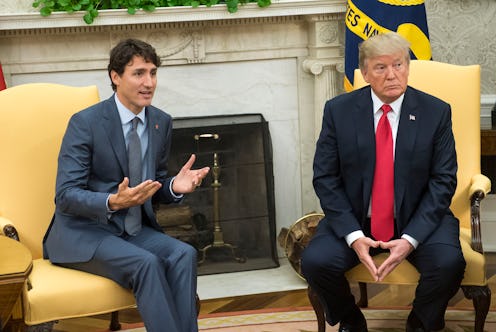News
Trump Reportedly Asked Justin Trudeau If Canadians Burned Down The White House?!

Well, you probably don't sit down with President Donald Trump for a history lesson. On Wednesday, CNN reported that in a conversation about trade and tariffs with Canadian prime minister Justin Trudeau, Trump asked if Canada burned the White House down, in an apparent reference to the war of 1812. But as many on social media have noted, the commander-in-chief seems to have gotten his history wrong.
The remark reportedly came in a May 25 phone call between the two leaders, with Trudeau irate that Trump was considering new tariffs on Canadian steel and aluminum, in the process portraying it as a "national security" issue. When Trudeau asked how Canada could possibly be viewed as a national security threat to the United States, according to CNN, Trump referenced the centuries-ago torching of the White House.
"Didn't you guys burn down the White House?" the president reportedly asked. In reality, the White House was burned down by British troops during the war of 1812, in retaliation for an attack on a British colony located in Ontario. The nation of Canada, as currently comprised, did not actually exist at the time; it was a British colony up until it was granted its independence in 1867, although full legal autonomy took even longer.
And even if it were true, that assumes a military action taken in 1812 would make modern Canada a national security threat, and therefore justify tariffs against it. In short, the president's reported remark has generated a lot of attention, in the mainstream media and on social media alike.
As the CBC detailed on Wednesday, Trudeau has offered a sharp-tongued response to the remark, calling it "insulting" that the U.S. would regard Canada, one of its longest and most reliable allies, a potential threat. "The idea that we are somehow a national security threat to the United States is quite frankly insulting and unacceptable," Trudeau said in an interview with NBC News.
Trump administration economic adviser Larry Kudlow responded to the tariffs during an interview on Fox News, claiming it's a "trade dispute" that isn't representative of the two countries' long history of cooperation.
"I don't think our tariffs are anything to do with our friendship and our longstanding alliance with Canada," Kudlow said. "This is a trade dispute, if you will. It can be solved if people work together."
Throughout the early months of his presidency, Trump and Trudeau struck a more diplomatic tone with one another than might have been predicted, given the former's right-wing worldview and the latter's progressive public image. The two met for the very first time at the White House in February 2017, just weeks after Trump was sworn in as president.
Earlier this year, however, the relationship has been evidently strained by Trump's intention to impose tariffs on foreign-imported aluminum and steel, including Canadian imports. Back in March, Trudeau condemned the proposed tariffs as "absolutely unacceptable." It seems safe to say that his outlook wouldn't be changed by Trump erroneously blaming Canada for the 1814 burning of the White House.
Historically, serious diplomatic tensions between the U.S. and Canada have been rare, although there have sometimes been disagreements, whether relating to matters of foreign policy, or the American use of military force.
Given a long shared border and considerable cultural similarities, the two nations are typically viewed as tight and very reliable allies, and not the sort of countries that would be likely to get involved in a trade dispute with one another. As Trump's recent statements show, however, and Trudeau's stern responses, that may quickly be changing in a big way.